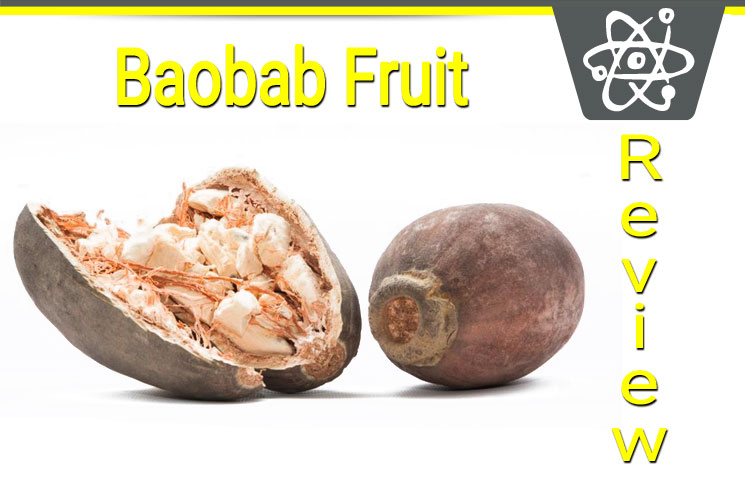Baobab Fruit Supplement Review
Baobab Fruit comes from nine trees in the genus Adansonia. Of the nine species, 6 are native to Madagascar, two to Africa, and one is native to Australia. Although baobab has been consumed in Africa for centuries, it has only recently made it to western markets.
It’s being called the “next superfruit” which should set off a huge alarm seeing as we’ve seen almost a dozen fruits fit the same MO. Let’s take a closer look into the Baobab Fruit.
What is Baobab Fruit?
Upon first inspection, you’ll notice the baobab fruit resembles an oval gourd, or a slimed down version of a watermelon. It has a wood shell on the outside and a velvety green coating.
As soon as you cut the fruit, you’ll find sinewy fibers, and hiding among the fibers are white fruits that sort of resemble marshmallows. These aren’t soft and tender marshmallows though. Instead, the flesh around the oil-rich seeds is dry and powdery. While this doesn’t sound ideal for manufacturing, it actually makes manufacturing much easier.
So what does the baobab fruit taste like? According to those who’ve consumed the fruit for centuries, it has a taste that sort of resembles a pear. Others describe it as somewhere between vanilla and pears. It’s not just the fruit either.
Locals use the leaves to form a kind of relish, the seeds are roasted, ground, and added to coffee. Baobab was even added to a gin that won a prestigious award at the International Wine & Spirits Competition in 2011.
Nutritional Content
So the baobab fruit has plenty of uses. What is the actual nutritional content found in the fruit? Prepare to be amazed – the baobab fruit has
— 6x The Antioxidants Of Blueberries
— 6x The Vitamin C In Oranges
— 2x The Calcium In Milk
— 1.5x The Magnesium Than Coconut Water
— 6x The Potassium Of Banners
— 5mg Of Soluble Fiber Per 100g
Considering many of these vitamins and minerals are considered the most important minerals for everyday function, it’s no wonder the baobab fruit is widely regarded in African nations. These aren’t the only vitamins and minerals either. There are well over 30 total found in the baobab fruit. Some of the other minerals include copper, iron, sodium and zinc.
Health Benefits of Baobab Fruit
Now that we know a bit about the baobab fruit and its’ nutritional content, what are the actual benefits to consuming the fruit? Better yet, what are the benefits to taking baobab fruit powder – a more concentrated form of baobab fruit?
#1 – Improved Skin Health
Foods rich in vitamin C are said to dramatically enhance the health of the skin, particularly when signs of aging become visible. The vitamin C found in baobab fruit powder helps your body form collagen and elastin, two structural proteins that keep your skin looking young and glowing.
Baobab fruit also has been shown to possess powerful antioxidant properties, which neutralize free radicals that harm the skin. According to research studies, baobab has 3-4x the antioxidant potential of many of our favorite fruits.
#2 – Heart Disease Prevention
Baobab fruit may also help reduce the risk for heart disease and stroke thanks to its’ ability to reduce c-reactive protein levels, which directly are related to the risk of heart disease. In addition, baobab may reduce cholesterol levels in the bloodstream, which may reduce the risk for a blockage and cause a heart attack.
Varicose veins may also be eliminated through baobab fruit powder. Some evidence suggests that vitamin C rich foods may help produce the connective proteins that keep veins strong and improve circulation. This may help partially eliminate varicose veins.
#3 – Liver Cleanser and Detoxifier
When your liver is not healthy, it will not effectively digest food or process metabolic waste. This can increase your exposure to toxic material and cause your entire body to suffer.
Luckily for you, it appears like baobab fruit may be able to help the body naturally detoxify and cleanse the liver of metabolic waste and chemicals, and some research suggests it may help prevent alcohol related liver damage. In one study, researchers believed the presence of various antioxidants and protective compounds were able to negate potential liver damage from toxins and alcohol abuse.
Is Baobab Fruit Powder Safe?
Baobab fruit powder has been consumed by those living in Africa for centuries and it is widely considered to be safe. There is no evidence that there are any potential negative side effects or health risks associated with either consuming the fruit or a supplement with fruit powder.
When purchasing a product, you may want to look to make sure it is manufactured using good manufacturing processes, or GMP. Organic baobab fruit powder always tends to be better quality as well if you want to really supercharge your health.
How to Buy Baobab Fruit Powder
Although baobab fruit powder supplements are fairly new, they are quickly growing in popularity. You can find quality supplements through online retailers like Amazon or other major wellness retailers.
Most supplements cost between $20-40 for a one-month’s supply, which isn’t necessarily cheap in the supplement world. However, the health benefits of baobab are truly incredible, and we feel confident in saying that it is one of the few true “superfruits” out there. If you’re looking to boost your energy levels, improve your skin health, or just want to increase your overall health, baobab is a decent option to consider.









